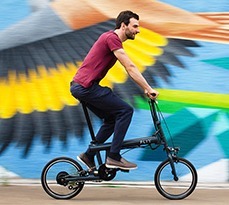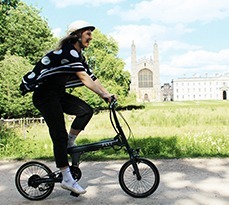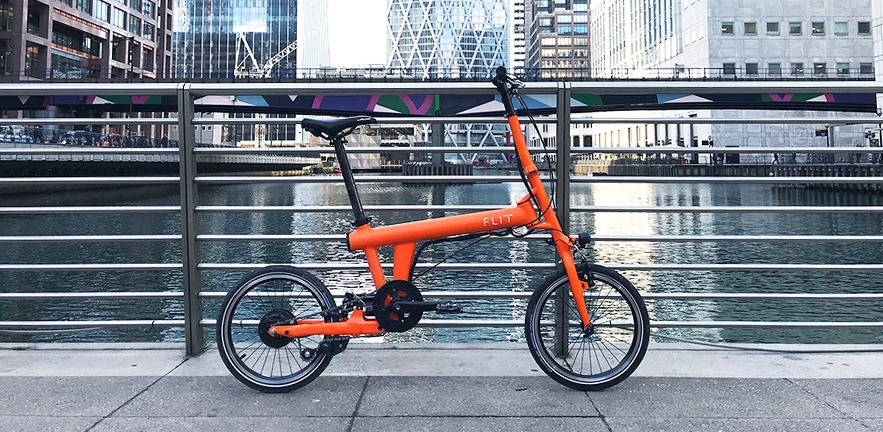A venture on the Accelerate Cambridge programme at Cambridge Judge Business School has designed a new electric bike with no visible battery and an easier folding mechanism.
It’s hard to reinvent the wheel, but Alex Murray and Dave Henderson have come up with a new design of portable electric bicycle that has a quicker way of folding and no visible battery attached.

They’ve teamed up to launch FLIT, a Cambridge-based startup that’s now on the Accelerate Cambridge programme at the Entrepreneurship Centre at Cambridge Judge Business School.
Unlike most foldable bikes, which fold by means of a large clamp in the middle of the bike frame, FLIT’s flagship lightweight (14 kilograms) FLIT-16 model is instead designed to fold in just 10 seconds by folding both the front and rear of the frame towards the middle – so it’s easier and faster for customers to fold it and then roll or carry it away.
And unlike most electric bikes that have a visible battery attached to the frame (owing to their conventional folding mechanism), the FLIT-16’s lithium battery is housed inside the bike’s top tube so you don’t see it. One of the key differences is that FLIT-16 was designed to be electric from the beginning.
“We didn’t want to create another folding bike that has been retrofitted to be electric,” says Alex, a former management consultant who was born in Toronto and spent his early childhood in Jamaica. “Instead we wanted to design a bicycle that is stylish, lightweight, electric – things that would appeal to many urban commuters.”
The bike has a top speed of 25 kilometres per hour, and a range per charge (three hours to full charge) of 30 to 50 kilometres depending on terrain and the user’s level of pedal assistance.
The frame is designed in Cambridge and manufactured in Taiwan, while the electric battery is co-designed with Taiwanese electronics giant Acer.

Dave, who hails from Redditch, England, says that with his background as a former automotive engineer for Jaguar Land Rover in the Midlands. “I focused on the bike’s geometry to give a comfortable and responsive ride. This flexibility is perfect for city journeys where clothes, traffic conditions and road surfaces can vary day to day.”
Alex and Dave met in 2015 at Tsinghua University in Beijing, where they were studying for masters’ degrees in public policy and automotive engineering. Alex says that e-bikes were a popular way for students to navigate Tsinghua’s sprawling campus, and this sparked their interest in developing their own model that would be better suited to the needs of European commuters.
Originally known as Hinton Bikes, FLIT was born in Cambridge in the summer of 2016, and now employs five people (including a marketer, designer and operational lead) and is based at the Future Business Centre in North Cambridge. The name was inspired by Alex’s childhood memories in Jamaica of humming birds “flitting” between flowers to feed: “It reminded me of people in cities moving around from place to place to go to work, go shopping or see friends.”
The bike has been developed with the assistance of 3D printing: parts are “printed” and then tested for fit and function before manufacturing begins at a plant they have selected in Taiwan, which is known for its specialty bicycle expertise.
The first prototype was completed in 2017, and the team has worked on a few more prototypes since then as they seek improvements. It is now possible to pre-order the bike for an introductory price of £1,699 through the FLIT website (in pastel blue, orange or grey), and the venture expects to deliver its first 200 e-bikes to customers this summer.
The plan is to ramp up production gradually with such a specialist product: “There cannot be any flaws, it needs to be perfect,” says Alex.
Stuart Blofeld, who works as a trainer in environmental management and safety in the construction industry, tested the FLIT-16 last summer and has pre-ordered the bike. “The ride was very smooth, and you can see it’s a very good quality product. I also wanted to buy local and at the same time reduce the use of my car,” says Stuart, who travels to London and other cities regularly from Milton Keynes.
Alex says Cambridge was an obvious choice as FLIT’s home “as it has the highest number of people cycling to work in the UK. Echoing Frank Sinatra’s New York, New York, he says: “If it won’t work here, it won’t work anywhere else.”
In summer 2017, FLIT joined the Accelerate Cambridge programme to learn business essentials such as fundraising, marketing and product development. Alex says they have also benefited from opportunities to perfect their presentation skills at the regular Pitch & Judge sessions and weekly catchups with mentors.
A key decision in the near future for FLIT is how they will distribute the e-bikes – via online direct sales, established retailers, or their own shops. The venture ran a successful product crowdfunding campaign last summer that reached its initial £25,000 target within minutes, going on to achieve over £145,000 in pre-sales for the FLIT-16. The company is now seeking to raise additional funds for its next stage of development.
“I’m proud that we managed to pull together a great product and team,” Alex says. “As the 150-year-old bicycle industry is rapidly disrupted by ebikes, the FLIT-16 represents a new way of getting around our cities.”


